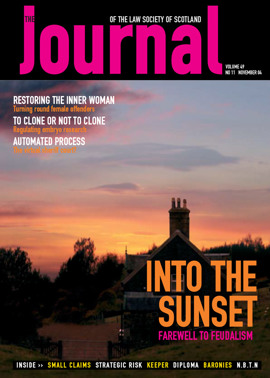A rough guide to becoming a partner

Two decades ago, shortly after the beginning of time, there was no doubt in the young lawyer’s mind. The sole purpose of boring your way past a law degree, dabbling with the Diploma and being tortured through a traineeship was to become a partner in a law firm.
When the apotheosis eventually arrived, bells would ring, the sky would brighten and angels would carry young James to a hallowed position above the clouds.
Now, young James and Jemima take a rather more sceptical view of the future. Only about 20% of law graduates have as their main target the obtaining of a partnership. And the rocky road leading to this happy consummation has lengthened for the assistant, with the additional stopping places of “Associate” and “Salaried Partner” before the true nirvana of profit-sharing status can be reached.
Young lawyers are suspicious of matters which 20 years ago did not trouble the naïve aspirants: matters such as personal liability, long working hours and a lack of holidays.
And, since about two thirds of new lawyers are women, the question arises of the interaction between the dual processes of (a) contributing genetic material to the human race and (b) contributing yourself, body and soul, to the legal profession.
Nevertheless, some young lawyers do still want to become partners in law firms and, as they grow older, so their aspirations will become more concentrated on this goal. So, what do you need to do to reach the golden throne?
The requirements of partnership differ from one firm to another and from one location to another. Many law firms are keen, nay desperate, to attract assistants with partnership potential. This is particularly true away from the glamorous (i.e. Edinburgh and Glasgow) city centres. If you are prepared to work in the less fashionable areas, the choice may be wide. You may need to show only some conveyancing and executry skills, a working knowledge of court procedures and a set of clean fingernails to impress the interviewer.
In the major city centre firms, a history of long working hours, good client-handling skills and a client following will be essential. The profit-sharing partners in these firms have climbed into their tree-houses and pulled the ladders up behind them. They will need to be sorely tempted before they allow a new entrant into their secret hidey holes.
Management skills may also be a requirement, particularly in marketing, personal development and finance (but beware of alarming the existing partner/managers by your possession of an MBA, a qualification they do not have – they may regard you as a threat, rather than an opportunity).
In between these extremes, law firms will be looking for a number of qualifications from potential partners, and may be unwilling to accept you as a new partner if you don’t possess them. These qualifications include:
A willingness to work hard – Despite the IT revolution and “working smarter”, most firms still require their partners to work long hours and you should be prepared to provide evidence of willingness to do so, during your time as an assistant/associate.
Ability to deal with clients – There is no point in being the best conveyancer on the block if you are a serial offender of your clients. (Actually, there is no point at all in being the best conveyancer on the block – that particular skill is rapidly becoming redundant.)
Yes, clients are nuisances, unreasonably interfering with your work and asking awkward questions, but “Clients make payday possible” and you should be able to demonstrate that, deep down, you love the little darlings.
Ability to gather new clients – Many firms survive on a diet of existing clients; but new clients are important too. An ability to attract new business (“rain-making”), either through your connections or from references from existing clients, is essential to the growth of any firm.
Development of others – The ability to teach those about you to handle more important jobs is a valuable asset. Without that, your opportunities to delegate work to your staff will be limited. And the ability to delegate is vital to your own future profitability and happiness.
IT skills – Incredibly, many law firms still have very limited IT functions; the email is on a computer in the basement and networking is a mystery. Many firms still do not have websites (or they are permanently “under development”). If you have the knowledge to improve their IT capabilities, you will appear positively seductive to such firms.
Financial skills – Under-charging and poor debt collection are two of the major drags on profits in many firms. A willingness to organise this and ensure better cashflow is a valuable asset, especially if combined with an understanding of the cashroom (and a good relationship with the cashier).
Friendliness – If you can’t get on with other people (not just the partners, but other assistants, the cashier and secretarial staff) then you probably shouldn’t be a partner in a law firm. Advocacy may be your bag, as you will not be required or expected to get along with anybody else.
In a law firm, being liked is a major asset: being disliked is a serious drawback.
However, be careful. To paraphrase Marx (that’s Groucho, not Karl), would you want to join a firm which would accept you as a partner?
Brian D Allingham never managed to persuade anyone to make him a partner, so had to set up his own firm. He is now retired from the law and works as a management consultant and adviser to small and medium-sized firms throughout Scotland.
In this issue
- Drafting consumer contracts
- Virtual firms: transactional learning on the web
- Ignorantia juris: it's all Greek to me
- Sheriff Court Rules Council consultation paper
- The Clinical Trials Directive - a summary
- Guarding the inner sanctum
- Neighbours in the global village
- Family law: is it the path for you?
- From sunset to sunrise
- What next for conveyancing?
- An ethical minefield
- Shredding the evidence
- Robbing the poor?
- Our dynamic profession
- A wider angle
- Keep the eye on the ball
- A rough guide to becoming a partner
- Rediscovering hope
- Sharpen your pencils
- Significant other
- Too far or not enough?
- Chipping away the infringers?
- View from Holyrood
- Website reviews
- Book reviews
- The Registers and the Appointed Day
- Feudal law: not just a relic
- Birth of a register






